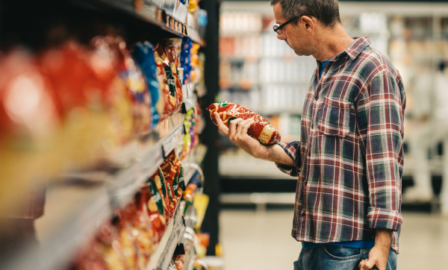Leverage S/4HANA in the Food and Beverage Industry to Combat Challenges
The food and beverage industry faces many challenges in 2021, including combatting the effects of the COVID-19 pandemic. The need to incorporate sophisticated product traceability and inventory management, all while meeting the rigorous regulatory conditions, presents a difficult terrain for food and beverage companies that must be overcome for them to prosper. As the wave of digitalization is taking over businesses worldwide, the food and beverage industry can also derive substantial benefits by making purposeful investments in technology. By integrating SAP S/4HANA, an established and widely-adopted solution, into their practices, food and beverage businesses can successfully mitigate the aforementioned risks while also paving the way for future growth.
S/4HANA in the Food and Beverage Industry:
The Need for Enhanced Product Traceability
Consumers are becoming more attentive to the product’s origin and its contents. The consumers’ desire to know more about the products they are purchasing has led food and beverage companies to integrate ‘ingredient labeling’ into the packaging process. Moreover, there has been a “precipitous decline” in consumer trust over the last five years. This is primarily attributed to the distance consumers feel from the production process, leaving them questioning the production companies and demanding transparency.
Consequently, end-to-end traceability within the food and beverage supply chain is crucial to the overall success of retaining consumer loyalty and trust. Food and beverage producers must maintain real-time data regarding their products’ weight, temperature, and expiration dates while providing accurate information to their consumers regarding the products’ origin, production methods, and ingredients. Consumers should have the ability to easily trace a given product’s history through their smartphones. For example, Fishpeople Seafood, a Portland-based frozen seafood processor, allows its customers to enter every product’s unique code onto the company website, which then provides the “backstory” of the product. However, providing such detailed information to the consumer requires meticulous record-keeping, presenting a challenge to food and beverage companies.
To address this challenge, SAP’s Logistics Business Network provides a detailed description of where and when a particular supply chain event took place. S/4HANA offers precise tracking of material flow through the entire production process- from the individual component to the finished product. Moreover, the goods issue date establishes the exact time and date when a product left a production plant to be delivered. This information can be viewed by all business partners within the traceability network. In addition, the traceability network also notifies all parties of any product-related alerts simultaneously. Therefore, all the involved parties are informed about any product issues or recalls. Lastly, all the product-specific data can be accessed via the user-friendly Product Batches – Search and Analyze application, which can be customized for the client’s specific needs. As such, an integration of S/4HANA in the food and beverage industry provides a multitude of opportunities for these companies to gain full control over their products’ traceability, ultimately providing clarity to and gaining their consumers’ trust.
Sustaining Meticulous Inventory Management Practices
Due to the perishability aspect of certain products, the limited shelf life presents another major challenge for the food and beverage industry. If the products are not stored and cared for in an appropriate manner, the challenge poses a risk of a spread of foodborne bacteria that may be passed on to the consumers. Ultimately, this may lead to significant monetary and reputational costs for food and beverage companies at a time when consumer trust is already low. Therefore, the need for excellent inventory management practices is imperative. Food processing, canning products, and packaging goods require meticulous tracking of inventory to mitigate potential risks.
SAP S/4HANA enables companies to integrate the necessary data and monitor all supply chain processes. Digital supply chain and vital business processes are supervised and supported across the enterprise with a primary real-time data source. SAP S/4HANA allows for live inventory management and enhanced MRP, ultimately reducing the days required to process inventory. More specifically, S/4HANA analyzes any variations in delivery plan and schedule, making well-timed changes, and ensuring on-time delivery. Through the utilization of demand predictions, food and beverage companies can enhance their forecasting practices and diminish the risks of obsolete or surplus inventory. The software also contributes to analyzing product movement across the supply chain, improving the inventory KPI analysis with actions on slow-moving materials. The entirety of the supply chain activities can be monitored on digital devices through SAP Fiori, enhancing the overall process with superior UX.
Overcoming the Stringent Regulatory Landscape
The continuous regulatory strains placed on food and beverage companies regarding food quality, surplus production, waste disposal, and rigorous documentation requirements pose an ever-lasting challenge for the food and beverage producers. The FDA and EPA are enforcing stricter standards when it comes to health-related products, food labels, and production transparency. The frequently changing amendments to rules have caused producers to recall products from stores, thereby increasing costs for the food and beverage companies. Producers must keep a high standard of business operations across the entire supply chain to address the challenge.
With SAP S/4HANA for product compliance, food and beverage companies can oversee regulations, track registrations and material levels, categorize products, and generate compliance records. The enhanced insight into compliance through analytics tools enables businesses to swiftly address any compliance inquiries. In addition to reducing the overall compliance-associated costs, this capability also upholds the F&B company brand image and gains consumers’ trust. Furthermore, these businesses frequently face regulations and compliance inquiries that may be highly specific to a state or country where they operate, presenting additional tracking and documentation difficulties. To reduce this obstacle, S/4HANA’s compliance components are grouped into compliance purposes, which usually represent a set of regulations for a given region and product. As such, SAP’s compliance capabilities reduce regulations’ complexities, providing meaningful time and cost-saving opportunities for businesses.
Ultimately, by integrating SAP S/4HANA into their business processes, food and beverage companies can significantly reduce the pains facing the industry and focus their efforts on delivering the best quality products to their customers. To learn more about the opportunities that S/4HANA presents to the food and beverage sector, please contact us today.
Subscribe to Clarkston's Insights
Contributions by Andrei Volkov.



